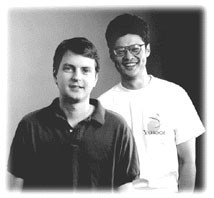Jerry Yang:
The Internet's Jolly Grin Giant
PAGE 4 OF 5
|
GOLDSEA | ASIAMS.NET | ASIAN AMERICAN PERSONALITIES
THE 130 MOST INSPIRING ASIAN AMERICANS The Internet's Jolly |
"David had it in his gut very early on that Yahoo could ultimately be a consumer interface to the Web rather than simply a search engine or piece of technology," recalled Yang. "We weren't really sure you could make a business out of it though." They neglected their PhD work to pump all their energies into Yahoo, but when it came to starting a commercially viable business, they were still leaning toward starting a site to sell college textbooks.
What ultimately convinced them to try to turn Yahoo into a business was their first call from a venture capitalist, Mike Moritz of Sequoia Partners. Among the investors Moritz lined up were Masayoshi Son, a young Corean Japanese who had founded Softbank, Japan's most successful digital publisher. Son had the instinct to snap up a 20% stake in Yahoo! By mid-1995 the duo held in their sweaty hands a check for their first million in venture capital. A few months later Yahoo! issued its initial public offering (IPO). Son snapped up another 17.02%, making himself controlling shareholder.
By then the stakes of Yang and Filo had been cut to about 12% apiece. Son had the sense to stay out of the public eye in order to preserve the company's freewheeling American flavor and image. A seasoned professional management team was installed to hold down the CEO, COO and CFO spots but Son kept the young founders in place as Yahoo!'s heart and soul under the title of Chief Yahoos. Their unofficial portfolio was to ooze irreverent inspiration. Yang was the more outgoing and better suited to carrying an empty briefcase while schmoozing on the cellphone. Filo took on a behind-the-scenes role with the subtler responsbility of keeping the company from getting ahead of its technological and financial resources. To clearly delineate his authority and responsibilities in Yahoo terminology, he carved himself the title "Cheap Yahoo". PAGE 5
 |
“David had it in his gut very early on that Yahoo could ultimately be a consumer interface to the Web rather than simply a search engine or piece of technology.” |
CONTACT US
|
ADVERTISING INFO
© 1996-2013 Asian Media Group Inc
No part of the contents of this site may be reproduced without prior written permission.
